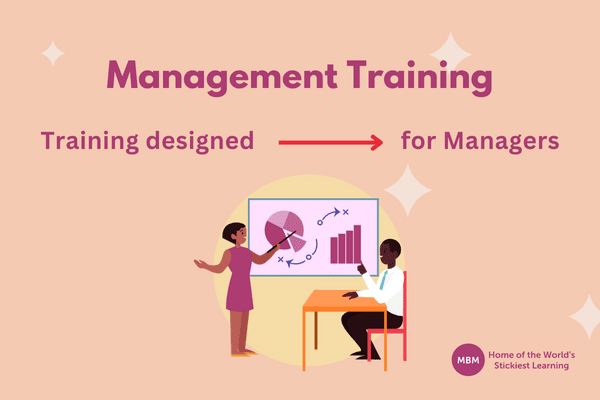Yes, Managers Need Training Too
Management training plays a critical role in the success of organisations today. In fact, effective management has a direct impact on employee morale, productivity, and ultimately, the bottom line.
However, with the fast pace of change in the modern business world, it can be a challenge to stay up-to-date with the latest skills and best practices.
In this article, we will delve into the importance of management training for new managers, the various approaches available, and the benefits it can bring to both employees and organisations.
What is Management Training?
Management training and development refers to the process of educating and developing the skills of managers to improve their performance in their roles.
Effective management is essential for the success of any organisation, and investment in management training is an investment in the future.
With the fast pace of change in today’s business world, it’s more important than ever for managers to stay up-to-date with the latest skills and best practices. These programs provide training on a variety of management training topics.

What Training Is Required for Managers?
The specific training requirements for managers can vary depending on the industry and the organisation, but there are certain core competencies and skills that are essential for all managers to have.
These include:
Business Acumen:
Managers need to have a strong understanding of the business they work in and the industry they operate within. This includes knowledge of financial management, strategic planning, and market trends.
Sticky Learning ® is 7 times more effective than 1-day training courses. Plus, you will get a Chain of Evidence proving your Return on Investment. Discover soft skills training that changes behaviours long term.

Leadership:
Effective leadership is critical for any manager. This includes skills such as communication, team-building, and conflict resolution.
Managers need to be able to inspire and motivate their teams, as well as make tough decisions when necessary. This is why we also offer a category management training course for managers in the UK Grocery Industry.
Performance Management:
Managers need to be able to set clear goals and expectations for their teams, and then effectively evaluate and develop their team members to meet those expectations.
This includes the ability to give constructive feedback, manage performance, and conduct performance appraisals.
Communication:
Good communication is vital for any manager. This includes the ability to articulate expectations, provide feedback, and effectively negotiate with others.
Change Management:
In today’s fast-paced business world, the ability to effectively manage change is a must-have skill for managers. This includes the ability to lead teams through change, manage resistance to change, and create a positive culture of change within the organisation.
These are just a few of the key skills and competencies that should be developed through management training.
The specific training required for managers will depend on the organisation, the industry, and the specific role of the manager.
However, by focusing on these core areas, managers can be well-equipped to lead their teams and drive results in their organisations.
What Is the Purpose of Management Training?

Improved Performance:
Management training plays a key role in improving the performance of individual managers and the teams they lead.
By providing managers with the skills and knowledge they need to be effective in their roles, they are better equipped to lead their teams, make sound business decisions, and drive results.
Additionally, through management training, managers can stay current with the latest best practices and trends in the field, which can help them stay ahead of the curve and continue to drive performance within their organisations.
Increased Efficiency:
Effective management has a direct impact on employee morale and productivity.
Additionally, by providing managers with the tools they need to effectively manage their teams, organisations can reduce the risk of costly mistakes, minimise waste, and streamline processes, all of which can contribute to increased efficiency.
Enhanced Employee Morale and Retention:
Investing in the development of your management team sends a strong message to employees about the organisation’s commitment to their growth and success.
This, in turn, can lead to improved retention, as employees are more likely to stay with the organisation when they feel valued and supported in their careers.
Competitive Advantage:
Finally, investment in management training can give organisations a competitive advantage in the marketplace.
By developing a well-trained and effective management team, organisations can better position themselves to succeed in today’s fast-paced business world.
Whether you are an individual manager looking to enhance your skills or an organisation looking to build a stronger management team, the right management training program can help you achieve your goals and give you the competitive edge you need to succeed.
What Are the 4 Types of Training?

On-the-Job Training:
On-the-job training involves learning through hands-on experience, typically under the guidance of a more experienced manager or mentor.
Additionally, on-the-job training provides managers with an opportunity to apply what they are learning in real-time, which can help them better understand the concepts and see their impact in the workplace.
Off-Site Workshops:
These workshops are structured training programs that take place away from the workplace, often in a conference or training centre.
Off-site workshops provide managers with an opportunity to learn from others, share best practices, and network with their peers.
This type of training is well-suited for managers who are looking for a more structured and intensive learning experience, or who are seeking to develop specific skills in a particular area.
Online Courses:
Management training online courses offer a flexible and convenient option for managers who are looking to develop their skills.
Online courses can be self-paced, or structured as a cohort, and can be a cost-effective way to get access to training on a wide range of topics.
Additionally, they are well-suited for managers who are looking for a flexible and convenient way to develop their skills, or who are seeking a more affordable option.
Blended Approaches:
Finally, many organisations are now utilising blended approaches to management training. This combines elements of on-the-job, off-site workshops, and online courses.
This type of approach can provide the benefits of each approach, while also allowing managers to tailor their training experience to their specific needs.
For example, a manager may start with an online course to build their foundation of knowledge. Then they would participate in an off-site workshop to dive deeper into a specific topic, and finally, receive on-the-job training to apply what they have learned in the workplace.
What Are Examples of Management Training?

Performance Management:
This is a critical aspect of effective management and involves setting clear expectations, providing feedback, and coaching and developing employees to meet their full potential.
Management training programs that focus on performance management often include topics such as goal setting, performance feedback, coaching, and motivation.
Leadership Development:
This is another important area of management training that focuses on helping managers develop the skills and qualities needed to lead their teams effectively.
Leadership and management training often includes topics such as communication, team building, conflict resolution, and decision-making.
Project Management:
Project management involves coordinating the efforts of a team to achieve specific goals and objectives within a defined timeline and budget.
Management training programs that focus on project management often include topics such as risk management, project planning, and team management.
Change Management:
Change management is the process of guiding individuals, teams, and organisations through the transition from one state to another.
Effective change management requires a deep understanding of the drivers of change as well as the skills to effectively communicate and implement change in the workplace.
Management training programs that focus on change management often include topics such as change leadership, communication, and change management processes.
Key Skills and Competencies Developed Through Management Training

Communication Skills:
Effective communication is key to successful management, and management training programs should aim to help managers develop their communication skills.
This may include training in active listening, presenting ideas clearly and effectively, and managing difficult conversations.
Management training programs may also provide opportunities for managers to practice their communication skills through role-plays and simulations.
Leadership and Team Management:
Leadership and team management are critical skills for managers, and management training programs should aim to help managers develop their ability to lead and manage teams effectively.
This may include training in topics such as delegation, motivation, performance management, and conflict resolution.
Management training programs may also provide opportunities for managers to practice their leadership and team management skills through group exercises and case studies.
Problem-Solving and Decision-Making:
Management training programs should aim to help managers develop their problem-solving and decision-making skills. They can do that by providing training in techniques such as root cause analysis and decision-making frameworks.
Management training programs may also provide opportunities for managers to practice their problem-solving and decision-making skills through case studies and simulations.
Strategic Thinking and Planning:
Effective management requires the ability to think and plan strategically, and management training programs should aim to help managers develop this critical skill.
This may include training in topics such as strategic planning, scenario planning, and resource allocation.
Management training programs may also provide opportunities for managers to practice their strategic thinking and planning skills through case studies and simulations.
The Role of Feedback and Coaching

Feedback is an essential component of effective management training. It allows managers to receive insights into their strengths and areas for improvement.
This feedback can come from a variety of sources, including supervisors, peers, and subordinates. Management training programs should provide opportunities for managers to receive both positive and constructive feedback.
Coaching is another critical aspect of management training. It provides managers with personalised support and guidance to help them achieve their goals. A coach can help managers identify areas for improvement.
All in all, management training programs should provide opportunities for managers to receive coaching. They should also equip managers with the skills and knowledge needed to provide effective coaching to their subordinates.
Evaluating the Effectiveness of Management Training Programs

Measurement of Outcomes:
Evaluating the effectiveness of management training programs begins with the measurement of outcomes. This may involve tracking changes in performance, and results.
These outcomes should be clearly defined and quantifiable. It is also important to ensure that these outcomes are being measured consistently over time.
Feedback from Participants:
In addition to measuring outcomes, it is also important to gather feedback from participants to evaluate the effectiveness of management training programs.
This feedback can be gathered through surveys, focus groups, and one-on-one interviews.
It is important to ensure that the feedback process is structured and consistent and that participants feel comfortable providing open and honest feedback.
Conclusion

In conclusion, management training is a critical investment for organisations that want to develop their leaders and improve their performance. Thus, effective management training programs should focus on developing the key skills that managers need to succeed. They should provide opportunities for feedback, coaching, and continuous improvement.
Do not overlook the role of diversity and inclusion in management training. It enables managers to create inclusive work environments that enhance engagement and productivity.
Evaluate the effectiveness of management training programs through outcome measurement. Participant feedback ensures that the programs achieve their goals and deliver desired results.
Invest in management training to invest in the future success of your organisation. Follow us on Linkedin for more useful content to help you reach your greatest potential.




